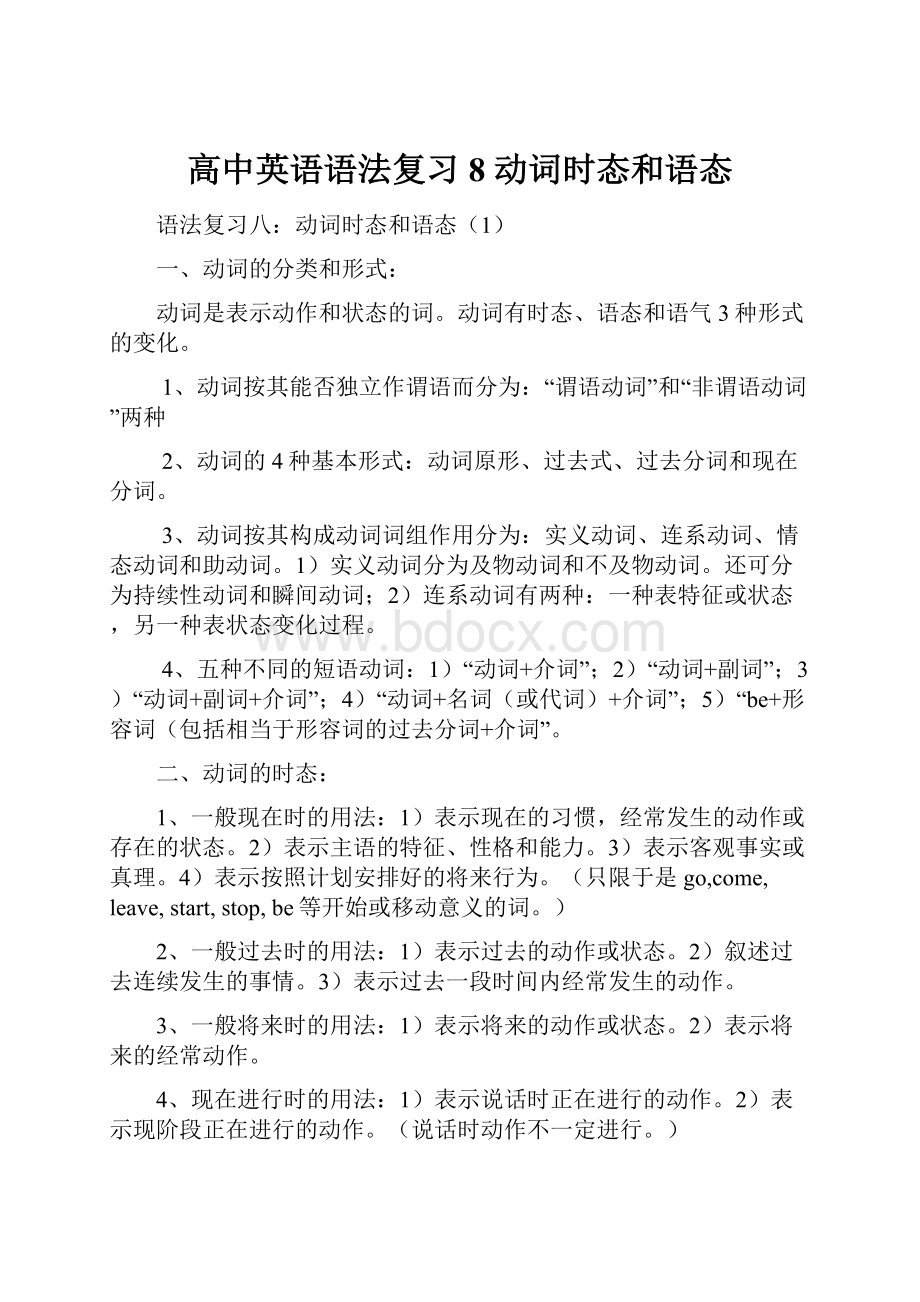高中英语语法复习8 动词时态和语态.docx
《高中英语语法复习8 动词时态和语态.docx》由会员分享,可在线阅读,更多相关《高中英语语法复习8 动词时态和语态.docx(13页珍藏版)》请在冰豆网上搜索。

高中英语语法复习8动词时态和语态
语法复习八:
动词时态和语态
(1)
一、动词的分类和形式:
动词是表示动作和状态的词。
动词有时态、语态和语气3种形式的变化。
1、动词按其能否独立作谓语而分为:
“谓语动词”和“非谓语动词”两种
2、动词的4种基本形式:
动词原形、过去式、过去分词和现在分词。
3、动词按其构成动词词组作用分为:
实义动词、连系动词、情态动词和助动词。
1)实义动词分为及物动词和不及物动词。
还可分为持续性动词和瞬间动词;2)连系动词有两种:
一种表特征或状态,另一种表状态变化过程。
4、五种不同的短语动词:
1)“动词+介词”;2)“动词+副词”;3)“动词+副词+介词”;4)“动词+名词(或代词)+介词”;5)“be+形容词(包括相当于形容词的过去分词+介词”。
二、动词的时态:
1、一般现在时的用法:
1)表示现在的习惯,经常发生的动作或存在的状态。
2)表示主语的特征、性格和能力。
3)表示客观事实或真理。
4)表示按照计划安排好的将来行为。
(只限于是go,come,leave,start,stop,be等开始或移动意义的词。
)
2、一般过去时的用法:
1)表示过去的动作或状态。
2)叙述过去连续发生的事情。
3)表示过去一段时间内经常发生的动作。
3、一般将来时的用法:
1)表示将来的动作或状态。
2)表示将来的经常动作。
4、现在进行时的用法:
1)表示说话时正在进行的动作。
2)表示现阶段正在进行的动作。
(说话时动作不一定进行。
)
5、过去进行进的用法:
1)过去某一时刻或某一段时间内正在进行的动作。
2)表示移动的动词:
come,start,stay,leave,go等词的过去进行时可以表示过去的将来要发生的动作。
3)wasgoingtodo可以表示在过去某一时间之后发生的动作。
6、现在完成时的用法:
1)表示刚刚完成的动作,常与just连用。
2)表示过去发生而持续到现在的动作或状态,甚至延续到将来。
常与since,for连用,但for,since不能与终止性的动词连用。
3)表示过去的动作对现在造成的影响或结果。
7、现在完成时与一般过去时的区别:
1)现在完成时与现在有联系,它表示过去的动作对现在所产生的结果、影响。
一般过去时通常表示在过去某一具体时间发生的动作,与现在没什么联系。
2)现在完成时表示过去延续到现在的行为;一般过去时着重过去某一时刻的某一具体动作。
8、过去完成的用法:
1)表示在过去某一或动作之前已经完成的动作。
常与by,before等介词短语或一个状语从句或上下文暗示。
2)表示由过去某一时间开始,一直延续到过去另一时间的动作,常和for(有时可省去)或since构成的短语或since引导的从句连用。
9、过去将来时的用法:
表示对于过去某一时刻而言将要发生的动作或存在的状态。
练习一:
动词时态与语态
(1)
1.WhenIsawMary,she______onthepiano.
A.isplayingB.playsC.wasplayingD.played
2.She______thedoorbeforeshegoesaway.
A.hadlockedB.islockingC.haslocked.D.waslocking.
3.Ahunterisamanwho______animals.
A.catchB.catchesC.willcatchD.wascatching
4.What_____ifIdrinkthis?
A.happensB.ishappeningC.willhappenD.ishappened
5.IwillvisityouifFather______me.
A.letB.letsC.islettingD.willlet
6.Lookout!
Thattree_____falldown.
A.isgoingtoB.willbeC.shallD.would
7.Myuncle_____toseeme.He'llbeheresoon.
A.comesB.iscomingC.hadcomeD.came
8.Theycan'tleaveuntilthey_____theirwork.
A.didB.aredoingC.havedoneD.hasdone
9."Hasheseenthisfilm?
""Yes.He______itseveraldaysago."
A.sawB.hasseenC.hadseenD.wasseeing
10.NowMikeisn'there.He______MrGreen's.Perhapshe______backinafewminutes.
A.wentto;iscomingB.hasgoneto;willcome
C.hasbeento;willbeD.isgoingto;hascome
11.Thatdayhe._______hisclothesbeforehecametoseeme.
A.haswashedB.washedC.hadbeenwashingD.waswashed
12.Ihaven'tfinishedmycomposition.I______fortwohoursandahalf.
A.havewrittenitB.havebeenwritingit
C.wroteitD.amwrittingit
13.IwilltakemydaughterwithmewhenI_____ShangHai,
A.gotoB.willgotoC.havebeentoD.havegoneto
14.Thisbrightgirl______thetruthinfrontoftheenemy.
A.didn'tsayB.couldn'tspeaktoC.saidD.didn'ttell
15.Thebridgewhich______lastyearlooksreallybeautiful.
A.wasbuiltB.builtC.wassetupD.hadbeenbuilt
16."When______schoolbegin?
""NextMonday."
A.hasB.doesC.didD.isgoingto
17.Iwill______heretillyougivemesomemoney.
A.leaveB.notleaveC.comeD.return
18.I_____heresinceImovedhere.
A.willworkB.workedC.workD.havebeenworking
19.EverytimeI_____there,Iwillbuyhimsomethingnice.
A.wentB.willgoC.goD.havegone
20.Itwassaidthathisfather______.
A.hasdiedB.died.C.hasbeendeadD.haddied
21.Wewon'tgounlessyou______soon.
A.hadcomeB.cameC.willcomeD.come
22._____sixyearssinceIbeganstudyingEnglish.
A.TheyhavebeenB.itisC.ItwasD.Thereare
23.They______theSummerPalacethreetimes.
A.havegonetoB.havebeentoC.havebeeninD.havegoneinto
24."Howlonghaven'tweseeneachother?
""Well,it_____nearlytwoyearssincewe______last."
A.is/havemetB.was/hadmetC.is/metD.hasbeen/hadmet
25."Haveyouseentheartexhibition?
""No,_____there."
A.itwasnotbeingheldB.theydidn'thold
C.ithadnotheldD.theywereholdingit
26.Don'tgetoffthebusuntilit______.
A.stopB.willstopC.stoppedD.hasstopped
27."Where______therecorder?
Ican'tseeitanywhere.""I_____itrighthere.Butnowit'sgone."
A.didyouput/haveputB.haveyouput/put
C.hadyouput/wasputtingD.wereyouputting/haveput
28.Theyaskedmetohaveadrinkwiththem.Isaidthatitwas10yearssinceI______agooddrink.
A.hadenjoyedB.wasenjoyingC.enjoyedD.hadbeenenjoying
29.Don'tcometonight.Iwouldratheryou_____tomorrow.
A.comeB.cameC.willcomeD.coming
30.______you______?
A.Do/marryB.Have/marriedC.Have/beenmarriedD.Are/married
31.Whenhe______allthenewspapers,he'llgohome.
A.sellsB.hassoldC.willhavesoldD.willbesold
32."Thiscloth_____welland_____long.""Ok.I'lltakeit."
A.washes/lastsB.iswashed/lastedC.washes/islastedD.iswashing/lasting
33."Hurryup,you______onthephone.""Oh,I'mcoming.Thankyou."
A.arewantedB.arebeingwantedC.wantD.arewanting
34.I______seeyou,butIdidn't,forIhadnotime.
A.hadwantedtoB.haswantedtoC.wantedD.waswanted
35.I______inGuangZhouforsixyearsbythisOctober.
A.havelivedB.waslivingC.willbelivingD.shallhavelived
36.Bythistimenextyearhe______fromthecollege.
A.willbegraduatingB.shouldbegraduating
C.willhavegraduatedD.isgraduating
37.Ourteachertoldusthattheearth_____fromwesttoeast.
A.turnsB.turnC.hasturnedD.hadturned
38.Mybrother_____whilehe_____hisbicycleandhurthimself.
A.fell/wasridingB.fell/wereriding
C.hadfallen/rodeD.hadfallen/wasriding
39.Billsaidhe____twenty-onethenextyear.
A.wasgoingtobeB.wasabouttobeC.couldbeD.wastobe
40.Itishightimeyou_____inbednow.
A.areB.wereC.willbeD.wouldbe
41.Afterawhileanagreement_____.
A.wasarrivedatB.wasarrivedinC.wasarrivedD.hasbeenarrived
42.TheairlinerfromBeijing_____at3:
00p.m.
A.isabouttoarriveB.hasarrivedC.arrivesD.isgoingtoarrive
43.______,thatstepisnotsafe!
A.LookaroundB.LookupC.LookoutD.Lookdown
44."Haveyou_____himtogiveupsmoking?
""No.I_____,buthewouldn'tlisten."
A.persuaded/triedB.tried/persuadedC.tried/triedD.persuaded/persuaded
45.Theresearchlaboratoryisgoingto______thenewtypeofcomputertouse.
A.takeB.makeC.putD.send
46.Idon'tknowwhenhe______,butwhenhe______,I'llletyouknow.
A.willcome/comesB.comes/willcomeC.comes/comesD.willcome/willcome
47.Howmuchdoyouthinkthatvase_____?
A.iscostB.usedC.waspaidforD.cost
48.I_____thathewouldbeabletoleavetomorrow,butit'sbeginningtolookdiffcult.
A.hopeB.hadhopedC.hopedD.amhoping
49.“Comeon,Peter,Iwanttoshowyousomething.”
“Oh,howniceofyou,I_____you_____tobringmeagift.”
A.neverthink/aregoingB.neverthought/weregoing
C.didn’tthink/aregoingD.hadn’tthought/weregoing
50.It’saniceflat,butit_____aproperbathroom.
A.haven’tgotB.hasn’tgotC.wouldn’tgetD.doesn’thavegot
51.Shehadashockwhensheheardthenews,_____?
A.hadn’tsheB.didn’tsheC.wouldn’tsheD.won’tshe
52.Thisliquid_____thesaltatroomtemperature.
A.becamemixedwithB.wasmixedby
C.mixeswithD.hasbeenmixingby
动词时态和语态
(2)
一、时态的呼应:
在复合句,从句(主要是宾语从句)中的时态,常受主句谓语动词的影响,这就叫做时态的呼应,时态的呼应一般有如下的情况。
1、如果主句的谓语动词为现在时态,其从句中的谓语动词应该用什么时态就用什么时态,如:
SheknowsyouhavebeeninBeijingforfiverears.
2、如果主句中的谓语动词为过去时态,从句中的谓语动词就要用过去时态,但要注意到下列情况:
(1)如果从句中的谓语动词所表示的动作与主句中的谓语动词所表示的动作同时发生,从句中须用一般过去时或过去进行时,如:
Shesaidshewasbusythen.
(2)如果从句中的谓语动词所表示的动作发生在主句谓语动词所表示的动作之前,从句中须用过去完成时,如:
Ididn’tknowthatshehadbeentoLondontwice.(3)如果从句中的谓语动词所表示的动作发生在主句谓语动词所表示的动作之后,从句须用过去将来时,如:
Theydidn’tknowwhentheywouldhavearest.(4)如果从句中说明的是一种普遍真理现象,虽然主句的谓语动词为过去时态从句中仍要用一般现在时,如:
WhenIwasalittlechild,myfathertoldmethattheearthisround.(5)如果从句中有表示具体过去时间的状语,虽然其谓语动词所表示的动作发生在主句谓语动词所表示的动作之前,从句仍用一般过去时,但如果该状语表示的时间不具体,则从句仍要用过去完成时,如:
Tomesaidhewasbornin1975.
二、被动语态:
英语动词的语态有两种:
主动语态和被动语态。
主动语态表示主语是动作的执行者,被动语态表示主语是动作的承受者,在被动语态的句子中,动作的执行者,一般由介词by引起的短语来表示,如:
Weoftenhelpthem.(主动)我们常帮助他们。
Theyareoftenhelpedbyus.(被动)他们常被我们帮助。
1、被动语态各时态的形式是由助动词be的各时态的形式加及物动词的过去分词构成。
2、被动语态八种时态的用法例句:
被动语态常用的八种时态的基本用法和主动语态各时态的
基本用法相同,只是句中的主语不是动作的执行者,而是动作的承受者,如:
(1)一般现在时:
NowEnglishistaughtinallmiddleschoolsinourcountry.
(2)一般过去时:
TheGreathallofthePeoplewasbuiltin1959.(3)一般将来时:
Whenwilltheworkbefinished?
(4)过去将来时:
Hetoldusthattheworkwouldbefinishedthenextday.(5)现在进行时:
Yourtractorisbeingrepairednow.(6)过去进行时:
Thechildwasbeingexaminedbythedoctorwhentheycamein.(7)现在完成时:
Theworkhasn’tbeenfinishedyet.(8)过去完成:
Thenewplanhadbeencarriedoutbeforethesecondexperimentbegan.
3、在下列情况下,一般使用被动语态:
(1)当不知道动作执行者是谁或没有必要提到动作执行者时,如:
PaperwasfirstmadeinChina.
(2)当强调或突出动作承受者的作用时,如:
Thenewmachinewasinventedbya20-year-oldyoungworker.
4、由主动语态转换为被动语态的几种句型:
(1)将一个句子由主动语态转换为被动语态时,可按下列步骤进行:
①先将主动结构的宾语改为被动结构的主语;②再将主动语态动词改为被动语态动词;③最后在被动语态之后加介词by,并将主动结构的主语放在by之后(经常被省略),构成介词短语;④由主动语态动词改为被动语态动词时,要注意被动语态动词中助动词be的各种形式变化,因为被动语态动词的不同人称和数是由助动词be不同的形式来表示的,如:
Treesareplantedeveryspring.(2)如果主动语态动词后又有直接宾语,又有间接宾语,一般是将间接宾语改为被动语态句中的主语,将直接宾语保留在原处。
如将直接宾语改为被动语态句中的主语,将间接宾语保留在原处时,一般要在间接宾语前加介词to或for,如:
Grandmatoldmeaninterestingstorylastnight.→Iwastoldaninterestingstorylastnight./Aninterestingstorywastoldtomelastnight.(3)主动语态中的宾语加带有宾语补足语时,改为被动语态时,就将宾语改为主语,将宾补保留在原处,而成为被动语态句中主语的补足语了。
宾补可以有下列几种情况:
①宾补为动词不定式,如:
Theyaskedhertosingasong.→Shewasaskedtosingasong.在动词make,see,hear